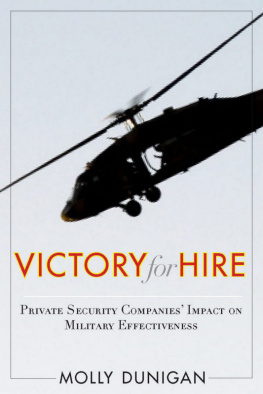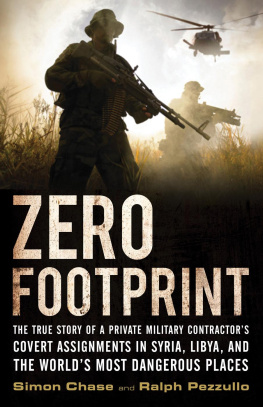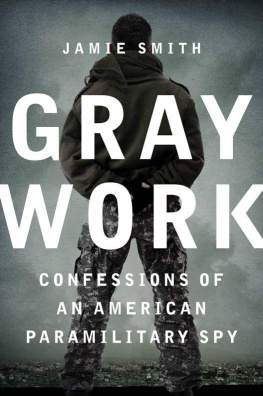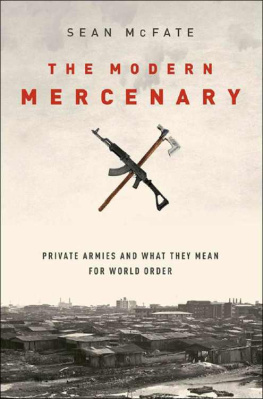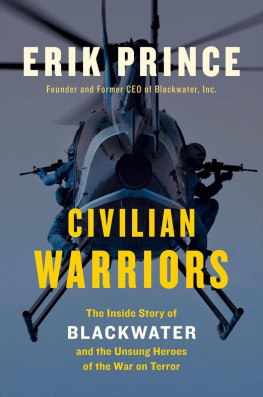Americas
Covert Warriors
Related Titles from Potomac Books, Inc.
Special Forces Today: Afghanistan, Africa, Balkans, Iraq, South America
Alexander Stilwell
Chasing Ghosts: Unconventional Warfare in American History
John J. Tierney, Jr.
Losing the Golden Hour: An Insiders View of Iraqs Reconstruction
James Stephenson
Overcoming the Bush Legacy in Iraq and Afghanistan
Deepak Tripathi
Through Veterans Eyes: The Iraq and Afghanistan Experience
Larry Minear
Americas
Covert Warriors
Inside the World of
Private Military Contractors
SHAWN ENGBRECHT

Copyright 2011 by Shawn Engbrecht
Published in the United States by Potomac Books, Inc. All rights reserved. No part of this book may be reproduced in any manner whatsoever without written permission from the publisher, except in the case of brief quotations embodied in critical articles and reviews.
Library of Congress Cataloging-in-Publication Data
Engbrecht, Shawn.
Americas covert warriors : inside the world of private military
contractors / Shawn Engbrecht. 1st ed.
p. cm.
Includes bibliographical references and index.
ISBN 978-1-59797-238-3 (hardcover : alk. paper)
1. Defense industriesUnited States. 2. Defense contractsUnited
States. 3. Contracting outUnited States. I. Title.
HD9743.U62E54 2010
338.4735500973--dc22
2010030257
Printed in the United States of America on acid-free paper that meets the American
National Standards Institute Z39-48 Standard.
Potomac Books, Inc.
22841 Quicksilver Drive
Dulles, Virginia 20166
First Edition
10 9 8 7 6 5 4 3 2 1
This book is dedicated to all those who, in uniform and out,
stepped forward when their nation asked. To those who muddled
through, doing right as best they could, ordinary souls displaying
extraordinary courage and self-sacrifice. This one is for all of you,
who went over and never came home. Your sunny memories
give me strength during the blackest of nights.
Be not afraid.
Contents
Acknowledgments
Writing a book is not dissimilar to preparing for a military operation in that there are dozens of people behind the scenes contributing to the success of the one at the sharp end. So it is with this volume. In my particular case the entire chain of support, from agent to production editor was female. They were collectively intolerant of fools, honest in their criticisms, and invariably right. I cannot imagine a more humbling or constructive experience and am grateful for their unfailing guidance. To that end any undiscovered errors in this tome are my fault alone. All credit belongs to them.
Thank you, Jodie Rhodes, my agent who discovered barely discernable nuggets of potential in my early writings. To Hilary Claggett, editor, friend, and ruthless master of red ink in rewrites. To Vicki Chamlee, whose copyedit was as detailed as it was consistently impeccable. To Kathryn Owens, who turned a digital mass of words into an amazing entity called a book. Thank you all.
And to Dr. Charles Springer, surgeon extraordinaire, who, on an afternoon not so very long ago in a trauma ward, reassembled a shattered and broken wreck that was my body into the one that I currently call home.
The wheelchair is long gone, along with nearly all the pain. And since the collection of titanium rods, nuts, plates, and screws used to remanufacture me is lighter than the bone it replaced, the sole legacy is that I am now able to climb higher and run faster than ever before. I reflect on that every time I am high above the clouds, gazing down at the earth far below. For what turned out to be the best afternoon of my life, I thank you.
Preface
I have discovered, since the start of the Iraq War in 2003, grave truths that lend credence to antiquated clichs. The tired old phrase Good men need only to do nothing for evil to prosper is now a constant companion, inevitably strolling alongside my memories of Iraq.
That the world is a dangerous place and becoming increasingly so, there is no doubt. The terrorist attacks of September 11, 2001, provide cogent rationale for maintaining a highly trained and superbly equipped military, which far too often serves as the only bulwark between peaceful democracy and malicious jihad. U.S. military forces will comprise uniformed men and women as well as private military contractors (PMCs) for the foreseeable future. That fact is not going to change anytime soon. So those hoping to find in this book a frenetic, left-wing rant about mercenaries tearing apart the fabric of American foreign policy will be sadly disappointed.
But those who dwell on the far right, whose unspoken motto pertaining to all things Iraqi or Afghan is Kill them all and let God sort them out, will find this volume equally sour to their literary palette. That leaves the silent majority of us, neither completely comfortable with nor dead set against the two conflicts the United States is engaged in half a world away. We are the same silent majority whose sons and daughters do nearly all of the fighting and dying.
The preponderance of those of us who have served in Iraq or Afghanistan, be it with the military or with contractors, have truly done the best we could in always difficult and often dangerous circumstances. As Winston Churchill proclaimed, We have muddled through. And just as the silent majority in which many of us are rooted, we have not had much to say, forfeiting our share of laudable, honest-toil headlines to one lunatic fringe element or anotherelements, whose only common ground is intolerance and a penchant for shouting down the other side. In their views, private military contractors have been portrayed as either mercenaries or super patriots. It was black or white, while the best color, the one of truthful gray, was missing. The headlines, both for the military and private contractors, grew larger as the war deteriorated.
It should come as no surprise that those headlines have not always been positive. The egregious conduct of those in charge of the dungeons at Abu Ghraib hogged the editorials that rightfully should have been describing how the American soldier, at great risk, was building schools and befriending a hostile populace. With the media ever more focused on the booms, bangs, and bloodshed of war, the superlative, day-by-grinding-day conduct of our men and women in uniform has been shunted to the editorial sidelines until the next bloody paroxysm of combat pushes them back to center stage. For those who depend on the wire services and the mini sound bites of television for information, one would presume the armed-forces have not had a good war after hearing incessant reports of suicides, spiraling casualties, and unit fatigue.
The private military companies, by comparison, have endured an exceedingly splendid conflict. Operating with near-total anonymity, these personnel, drawn mostly from the silent majority of America, deployed overseas for myriad reasons. Some volunteered, truly believing in the legitimacy of delivering democracy to Iraq. Many came because they supported their government in time of war. For them, it was the right thing to do. The first wave of private contractors arriving in 2003 was exclusively ex-military, professional, and extraordinarily competent. In short order, less talented others were lured by financial opportunity, which is certainly not against the law. The truth is that very few contractors arrived with the intent to massacre unarmed civilians, just as the military police running rampant in Abu Ghraib never deployed with orders detailing how to connect an electrode to a penis.
Next page


